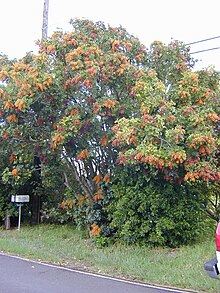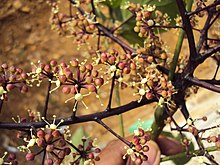Schefflera
| Schefflera | |
|---|---|

| |
| Schefflera arboricola | |
| Scientific classification | |
| Kingdom: | |
| (unranked): | |
| (unranked): | |
| (unranked): | |
| Order: | |
| Family: | |
| Subfamily: | |
| Genus: | Schefflera J.R.Forst. & G.Forst. (1775)
|
| Diversity | |
| c. 600 species | |
Schefflera /ˈʃɛflərə/[1] is a genus of flowering plants in the family Araliaceae. The plants are trees, shrubs or lianas, growing 1–30 metres (3 ft 3 in – 98 ft 5 in) tall, with woody stems and palmately compound leaves. The circumscription of the genus has varied greatly. Phylogenetic studies have shown that the widely used broad circumscription as a pantropical genus of over 700 species is polyphyletic, but it remains to be seen how this will affect the classification of the genus.[2][3]
Several species are grown in pots as houseplants, most commonly Schefflera actinophylla (Umbrella Tree) and Schefflera arboricola (Dwarf Umbrella Tree). Numerous cultivars have been selected for various characters, most popularly for variegated or purple foliage. Schefflera species are used as food plants by the larvae of some Lepidopteran species including Batrachedra arenosella (recorded on S. stellata). Schefflera arboricola and Schefflera actinophylla can be used to attract birds.[4]
The genus is named in honor of Johann Peter Ernst von Scheffler (born in 1739), physician and botanist of Gdańsk, and later of Warsaw, who contributed plants to Gottfried Reyger for Reygers book, 'Tentamen Florae Gedanensis'.[5][6][7]
Taxonomy


The genus has had a turbulent taxonomic history; the list of synonyms includes:
- Actinomorphe (Miq.) Miq.
- Actinophyllum Ruiz & Pav.
- Agalma Miq.
- Astropanax Seem.
- Bakeria Seem.
- Brassaia Endl.
- Cephaloschefflera (Harms) Merr.
- Crepinella Marchal
- Didymopanax Decne. & Planch.
- Dizygotheca N.E.Br.
- Geopanax Hemsl.
- Heptapleurum Gaertn.
- Neocussonia Hutch.
- Nesopanax Seem.
- Octotheca R.Vig.
- Parapanax Miq.
- Paratropia (Blume) DC.
- Scheffleropsis Ridl.
- Sciadophyllum P.Browne
- Tupidanthus Hook.f. & Thomson
References
- ^ Western Garden Book (6th ed.). Sunset Pub Co. 1995. pp. 606–607. ISBN 978-0-376-03850-0.
- ^ G. M. Plunkett, Porter P. Lowry II, D. G. Frodin & Jun Wen (2005). "Phylogeny and geography of Schefflera: pervasive polyphyly in the largest genus of Araliaceae". Annals of the Missouri Botanical Garden. 92 (2): 202–224. JSTOR 3298514.
{{cite journal}}: CS1 maint: multiple names: authors list (link) - ^ Pedro Fiaschi; Gregory M. Plunkett (2011). "Monophyly and phylogenetic relationships of Neotropical Schefflera (Araliaceae) based on plastid and nuclear markers". Systematic Botany. 36 (3): 806–817. doi:10.1600/036364411X583754.
{{cite journal}}: Unknown parameter|lastauthoramp=ignored (|name-list-style=suggested) (help) - ^ Johan Dalgas Frisch, Christian Dalgas Frisch (2005). Aves Brasileiras e Plantas que as atraem. São Paulo: Dalgas Ecotec. ISBN 85-85015-07-1.
- ^ Forster. J.R. and Forster, G. Characteres Generum Plantarum. 1776
- ^ Reyger, G. Tentamen Florae Gedanensis. vol. 2. 1766
- ^ Schumann, E., ed. (1893). "Die einheimisclien Mitglieder der Gesellschaft, Lebensläufe". Schriften der Naturforschenden Gesellschaft in Danzig. 8 (2): 83.
Further reading
- Frodin, D. G. and R. Govaerts. 2004. World Checklist and Bibliography of Araliaceae. Kew Publishing. ISBN 978-1-84246-048-1
External links
